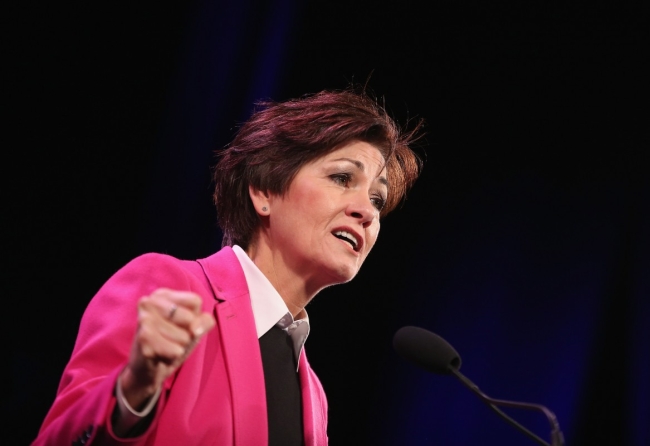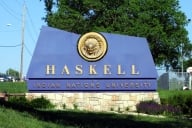You have /5 articles left.
Sign up for a free account or log in.

Kim Reynolds
Getty Images
Students on two Iowa campuses are accusing the state's Republican governor of trying to suppress the college vote -- which tends to swing liberal -- in an upcoming special election for a state seat.
This is the latest in a series of voter suppression allegations against GOP politicians nationwide over the last few years. Particularly before the last midterm election, which was viewed as a chance for Democrats to reclaim offices that have been controlled by conservatives both in the states and federally, Republican lawmakers were denounced for trying to limit college students’ voting rights, through legislation and otherwise.
Iowa governor Kim Reynolds now faces such criticism after she scheduled a special election on Aug. 6 to replace former state representative Lisa Heddens, a nine-term Democrat who left the Legislature last month for a seat in a county government.
The election date occurs before Iowa State University students -- who would be voting in the open district -- return to campus for classes, and so many of them will likely not be able to participate.
In a rare joint editorial, the editorial boards at the Iowa State student newspaper, The Iowa State Daily, and The Daily Iowan, the University of Iowa paper, blasted the decision.
“Whether it’s an intentional effort by GOP politicians to suppress students’ mostly Democratic votes or simply a failure to account for the demographics of their constituents’ legislative districts, Reynolds’s election proclamation is just the latest in the state Legislature’s efforts to suppress students’ votes and silence their voices on the issues they care about most,” the students wrote.
A spokesman for Reynolds did not respond to requests for comment, but the governor has shrugged off such criticism in the past. Earlier this year, Reynolds set a special election date for a state senate seat formerly held by a Democrat for mid-March, when University of Northern Iowa students -- who would be voting in that district -- were on spring break. When the Associated Press asked if she was aware of that fact, Reynolds said, “It doesn't really matter.”
The race was quite prominent. After State Senator Jeff Danielson resigned, at least 10 potential or declared presidential candidates publicly advocated for Eric Giddens, the Democratic contender to replace him. U.S. senator Amy Klobuchar, a Minnesota Democrat, and Democratic former Texas representative Beto O’Rourke stopped into Waterloo to canvass for both Giddens and themselves (Iowa is considered a key state in presidential contests).
Giddens, then a local school board member, eventually won the seat.
Reynolds told AP prior to the election that students could request an absentee ballot or vote in a county auditor's office the week before the election.
The student editors wrote in their essay that perhaps the timing of elections could be chalked up to “blissful ignorance,” but noted other measures that Iowa politicians have tried to pass to apparently disenfranchise college students.
A Republican lawmaker introduced a bill this past legislative session that would have banned state-owned buildings as satellite voting centers, meaning public universities couldn’t set up early voting locations on any of their campuses. State Senator Roby Smith, the bill's sponsor, argued that it would have increased polling efficiency. It did not pass.
A federal judge in Florida had ruled in 2018 that that state's prohibition of early-voting centers on campuses was an unconstitutional and deliberate attempt to discriminate against student voters.
In 2017, the Iowa Legislature got through a bill that requires voters to show government-issued identification, which many civil advocacy groups consider to be a major barrier for impoverished citizens or minority voters, but also college students, who may be voting for the first time. Students are also transient and may be entering college from another state, and likely would be unfamiliar with their new home state's processes.
Republican politicians maintain they are trying to protect elections from fraud with voter ID laws.
“You have a state where the same political party as recently instituted a strict voter ID law that excludes student IDs attempted to pass a bill to prohibit early-voting sites on colleges and university campuses and scheduled two special elections in districts with very large student populations when school is not in session,” said Mike Burns, national director for the Campus Vote Project, a nonpartisan offshoot of the Fair Elections Legal Network. “That is a strong theme of purposefully suppressing student voting.”
College-age students in Iowa are voting in record numbers, too. Nearly 40 percent of registered voters ages 18 to 34, which encompasses the traditional age for college students, participated in the 2018 midterm election, according to the Iowa secretary of state.
This is the highest turnout since at least 2002 -- voter turnout in that age range never surpassed 30 percent in midterm elections since that year. These are voters that tend to identify on the political left. According to the Pew Research Center, 58 percent of 18- to 25-year-olds considered themselves Democrats or leaned Democrat.
“These numbers are a very positive sign, but we can do better,” Paul Pate, the secretary of state, a Republican, said in a statement. “Young people traditionally are the least likely to vote, and that trend continues, but these numbers show substantial improvement over previous elections. My office will continue its outreach initiatives to high school and college students, encouraging them and all eligible Iowans to engage in the electoral process.”








